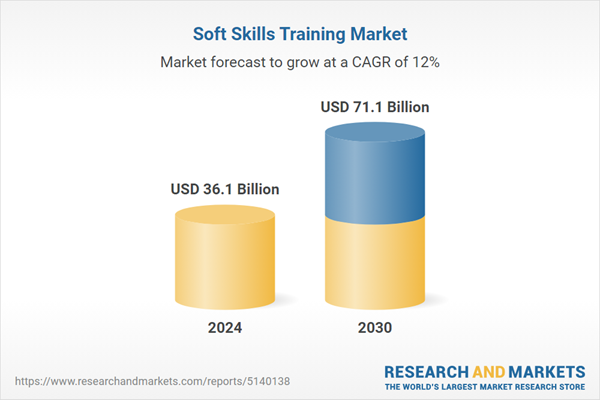Global Soft Skills Training Market - Key Trends and Drivers Summarized
Why Is There a Growing Demand for Soft Skills Training Across Industries?
Soft skills training has become a critical component of workforce development strategies across industries, as companies recognize the importance of interpersonal, communication, leadership, and problem-solving skills in driving organizational success. With the rise of automation and digital transformation, technical skills alone are no longer sufficient to thrive in the modern workplace. Soft skills, such as emotional intelligence, adaptability, collaboration, and customer service, are increasingly valued by employers as they enhance team dynamics, improve customer relations, and drive innovation. The growing emphasis on employee engagement, retention, and productivity is further propelling the demand for soft skills training programs. Companies are investing in comprehensive training solutions to equip their workforce with the necessary skills to navigate complex and dynamic work environments, particularly in sectors like finance, healthcare, IT, and retail.How Are Technological Advancements Shaping the Future of Soft Skills Training?
Technological advancements in e-learning platforms, virtual reality (VR), augmented reality (AR), and artificial intelligence (AI) are revolutionizing soft skills training, making it more interactive, personalized, and effective. The integration of AI-driven analytics and feedback mechanisms is enabling organizations to assess skill gaps, track progress, and tailor training programs to individual needs. The use of VR and AR technologies is creating immersive learning experiences that simulate real-life scenarios, allowing employees to practice and develop soft skills such as conflict resolution, leadership, and communication in a safe environment. Gamification and microlearning techniques are also gaining traction, making training more engaging and accessible. These technological innovations are expanding the reach and effectiveness of soft skills training, supporting its adoption across diverse industries.Which Market Segments Are Driving Growth in the Soft Skills Training Industry?
Delivery modes include online, offline, and blended, with online training holding the largest market share due to its flexibility, scalability, and cost-effectiveness. End-use industries comprise corporate, education, government, healthcare, and others, with corporate being the dominant segment due to the high demand for employee development programs. Training types are categorized into communication and interpersonal skills, leadership and management, problem-solving and critical thinking, teamwork and collaboration, and customer service, with communication and leadership training leading the market due to their critical role in organizational success. Geographically, North America dominates the soft skills training market due to the high adoption of digital learning solutions and a strong emphasis on employee development, while Asia-Pacific is expected to witness significant growth due to the expanding corporate sector and increasing focus on skills enhancement.What Are the Key Drivers of Growth in the Soft Skills Training Market?
The growth in the soft skills training market is driven by several factors, including the increasing importance of soft skills in workforce development, advancements in digital learning technologies, and the rising focus on employee engagement and retention. The shift towards remote work and virtual teams is driving the demand for online and blended training solutions that enhance communication, collaboration, and leadership skills. Technological innovations, such as AI-driven analytics, VR simulations, and gamification, are making soft skills training more personalized, engaging, and effective, supporting its adoption across various sectors. The growing emphasis on diversity, equity, and inclusion (DEI) training programs, coupled with the need for upskilling and reskilling in response to digital transformation, is creating new opportunities for soft skills training providers. Additionally, the expansion of corporate and educational training programs in emerging markets is further supporting the growth of the soft skills training market.Report Scope
The report analyzes the Soft Skills Training market, presented in terms of market value (USD). The analysis covers the key segments and geographic regions outlined below.- Segments: Skill Type (Management & Leadership, Administration & Secretarial, Communication & Productivity, Teamwork, Other Skill Types); Channel Provider (Corporate / Enterprise, Academic / Education, Government).
- Geographic Regions/Countries: World; United States; Canada; Japan; China; Europe (France; Germany; Italy; United Kingdom; and Rest of Europe); Asia-Pacific; Rest of World.
Key Insights:
- Market Growth: Understand the significant growth trajectory of the Management & Leadership segment, which is expected to reach US$22.7 Billion by 2030 with a CAGR of 10.9%. The Administration & Secretarial segment is also set to grow at 10.1% CAGR over the analysis period.
- Regional Analysis: Gain insights into the U.S. market, valued at $9.8 Billion in 2024, and China, forecasted to grow at an impressive 11.1% CAGR to reach $10.8 Billion by 2030. Discover growth trends in other key regions, including Japan, Canada, Germany, and the Asia-Pacific.
Why You Should Buy This Report:
- Detailed Market Analysis: Access a thorough analysis of the Global Soft Skills Training Market, covering all major geographic regions and market segments.
- Competitive Insights: Get an overview of the competitive landscape, including the market presence of major players across different geographies.
- Future Trends and Drivers: Understand the key trends and drivers shaping the future of the Global Soft Skills Training Market.
- Actionable Insights: Benefit from actionable insights that can help you identify new revenue opportunities and make strategic business decisions.
Key Questions Answered:
- How is the Global Soft Skills Training Market expected to evolve by 2030?
- What are the main drivers and restraints affecting the market?
- Which market segments will grow the most over the forecast period?
- How will market shares for different regions and segments change by 2030?
- Who are the leading players in the market, and what are their prospects?
Report Features:
- Comprehensive Market Data: Independent analysis of annual sales and market forecasts in US$ Million from 2024 to 2030.
- In-Depth Regional Analysis: Detailed insights into key markets, including the U.S., China, Japan, Canada, Europe, Asia-Pacific, Latin America, Middle East, and Africa.
- Company Profiles: Coverage of players such as Active Up, ALEMCO, CBLPro, Conversari Global LLC., Dale Carnegie & Associates, Inc. and more.
- Complimentary Updates: Receive free report updates for one year to keep you informed of the latest market developments.
Some of the 12 companies featured in this Soft Skills Training market report include:
- Active Up
- ALEMCO
- CBLPro
- Conversari Global LLC.
- Dale Carnegie & Associates, Inc.
- Docendi
- eInfochips
- E-Learning WMB
- Enspark
- Frank Butler Consultants
This edition integrates the latest global trade and economic shifts into comprehensive market analysis. Key updates include:
- Tariff and Trade Impact: Insights into global tariff negotiations across 180+ countries, with analysis of supply chain turbulence, sourcing disruptions, and geographic realignment. Special focus on 2025 as a pivotal year for trade tensions, including updated perspectives on the Trump-era tariffs.
- Adjusted Forecasts and Analytics: Revised global and regional market forecasts through 2030, incorporating tariff effects, economic uncertainty, and structural changes in globalization. Includes historical analysis from 2015 to 2023.
- Strategic Market Dynamics: Evaluation of revised market prospects, regional outlooks, and key economic indicators such as population and urbanization trends.
- Innovation & Technology Trends: Latest developments in product and process innovation, emerging technologies, and key industry drivers shaping the competitive landscape.
- Competitive Intelligence: Updated global market share estimates for 2025, competitive positioning of major players (Strong/Active/Niche/Trivial), and refined focus on leading global brands and core players.
- Expert Insight & Commentary: Strategic analysis from economists, trade experts, and domain specialists to contextualize market shifts and identify emerging opportunities.
Table of Contents
Companies Mentioned (Partial List)
A selection of companies mentioned in this report includes, but is not limited to:
- Active Up
- ALEMCO
- CBLPro
- Conversari Global LLC.
- Dale Carnegie & Associates, Inc.
- Docendi
- eInfochips
- E-Learning WMB
- Enspark
- Frank Butler Consultants
Table Information
| Report Attribute | Details |
|---|---|
| No. of Pages | 179 |
| Published | February 2026 |
| Forecast Period | 2024 - 2030 |
| Estimated Market Value ( USD | $ 36.1 Billion |
| Forecasted Market Value ( USD | $ 71.1 Billion |
| Compound Annual Growth Rate | 12.0% |
| Regions Covered | Global |









